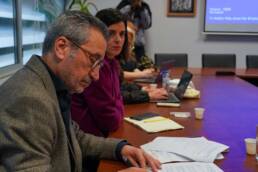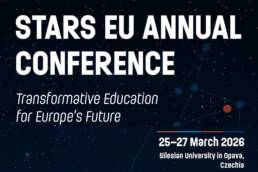Mid-term working meeting of STARS EU begins at the University of La Laguna
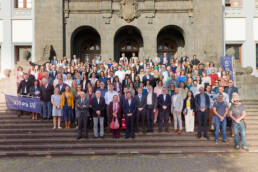
Nearly 200 people from nine universities affiliated with the STARS EU alliance have met from today, Tuesday, November 25, until tomorrow, the 26th, at the University of La Laguna to participate in the working meeting to advance the objectives of this ambitious project that encompasses education , research , mobility and local development.
During the ceremony, representatives from the various partner universities gave brief presentations on the milestones achieved in different areas of work during the first two years of activity. They also outlined the objectives for this working meeting held at the University of La Laguna. The event was introduced by José Sigut, the alliance coordinator at the ULL, and the first speaker was Marieke Steenbergen from Marie & Louis Pasteur University. Speaking on behalf of the alliance’s steering committee, she provided an overview of the alliance, which comprises nine universities located in non-capital regions facing similar local challenges. Together, they represent a community of 150,000 students, 15,000 professors, researchers, and staff, across 75 faculties.
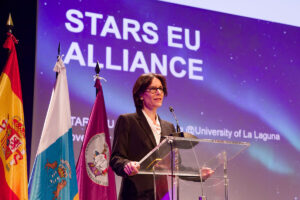
She explained the organizational structure of the alliances and some of the objectives achieved in this two-year period, such as the mobility of more than 4,300 people to date; the creation of common undergraduate degrees, of which 14 are currently under discussion; the launch of 40 BIP courses, half of which have already been delivered; the design of 36 micro-credentials; the launch of the Technology Transfer Office to share the scientific infrastructures of the nine universities; the launch of seed grants to prepare proposals for competitive European calls; and the launch of three Living Labs to encourage impact on local regions.
Work packages and TIG
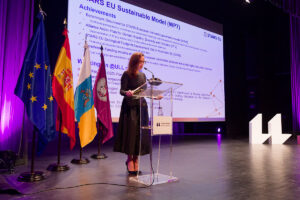 Next, representatives from the STARS EU work packages briefly introduced their progress to date: package 2, (Regional Transition Acceleration); package 3 (Curriculum Lab) which is responsible for academic innovation and the teaching offer; package 4, (Challenge Lab), which is responsible for research in the alliance; package 5, related to physical and virtual campuses, which during the meeting in Tenerife will present examples of the visual elements available to identify the spaces of the alliance in each institution; package 6, in charge of mobility; package 7, which addresses the sustainability model of the alliance not only referring to environmental aspects, inclusion and equality, but also financing and governance; and the 8th, on communication, dissemination and open science.
Next, representatives from the STARS EU work packages briefly introduced their progress to date: package 2, (Regional Transition Acceleration); package 3 (Curriculum Lab) which is responsible for academic innovation and the teaching offer; package 4, (Challenge Lab), which is responsible for research in the alliance; package 5, related to physical and virtual campuses, which during the meeting in Tenerife will present examples of the visual elements available to identify the spaces of the alliance in each institution; package 6, in charge of mobility; package 7, which addresses the sustainability model of the alliance not only referring to environmental aspects, inclusion and equality, but also financing and governance; and the 8th, on communication, dissemination and open science.
There was also a summary presentation of the nine thematic groups of interest ( TIG ) on the different subjects that structure the research and training proposals of the alliance: energy transition, arts and creative industries, entrepreneurship and innovation, sustainable industry, circular economy, digital transformation, healthy ageing, lving spaces, and inclusion and social justice.
Local authorities
Local goverments representatives were also present at the event, who highlighted the great opportunity that having one of its universities in a European alliance like STARS EU represents for the Canary Islads, a type of inter-university collaboration structure promoted by the European Commission to increase the competitiveness of the community academic system.
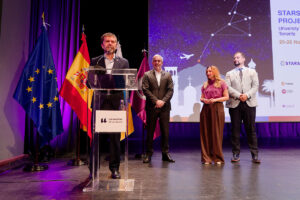
The rector of the host institution , Francisco García , emphasized that, above scientific and academic considerations, the alliance is a space that underscores the importance of the European values of “ unity, diversity, knowledge, and solidarity”. In his address, he highlighted the role that institutions in the outermost regions can play within the European context. He also emphasized that the alliance’s work focuses on aspects such as inclusion , sustainability, and the digital transition, all essential for providing the necessary skills for the new generation of the 21st century to thrive in an increasingly changing and competitive society , promoting mobility and collaborative work.
During his speech, the President of the Government of the Canary Islands, Fernando Clavijo, also emphasized the status of the outermost regions within the European Union at a time when these regions are being questioned within EU institutions: “The outermost regions are not a burden. We are a strategic opportunity for Europe, and this is the best example. We are territories that contribute to cohesion, that expand Europe’s borders, that connect continents, and that offer innovation , talent, and proven scientific capacity. Projects like the one that brings us together here today are the best example. That is our commitment: that the Canary Islands be known for what it knows, for what it researches, and for what it contributes to the world.”
For her part, the president of the Tenerife Island Council, Rosa Dávila , expressed the council’s commitment to research , for which a budget of 200 million euros has been allocated, and also addressed the issue of the outermost regions. “ We are facing profound transformations influenced by the energy transition , digitalization , job automation , artificial intelligence, demographic challenges , and the need to diversify our economic models . In this context, universities play an irreplaceable role. You are engines of knowledge, spaces for critical thinking , laboratories of innovation , and meeting points between academia , the public sector , and the productive sector . ”
Regarding the First Deputy Mayor of San Cristóbal de La Laguna, Badel Albelo, he highlighted the role of the local university in adapting to a changing socio-economic context that demands agility. “ From the City Council, we highly value this internationalization strategy because it will allow the University of La Laguna (ULL) to continue attracting talent and to remain committed to scientific innovation . The challenges we face in healthcare and the economic diversification that our islands need for balanced development require a strong public university to drive it forward, and this alliance will allow us to work in that direction.”
Related Posts
February 6, 2026
Celebrate the International Day of Women and Girls in Science with STARS EU
The alliance demonstrates its commitment to full and inclusive participation of…
February 3, 2026
Bragança Polytechnic University and University West strengthen their strategic cooperation in research and doctoral training within STARS EU
The meeting addressed the implementation of joint doctorates and the connection…
January 30, 2026
Education to address new challenges, focus of the third STARS EU Annual Conference
The next event will take place in March 2026 at the Silesian University in…


